National Grid Backhoe Accident on I-495 Puts Focus On Safety
A deadly motor vehicle crash involving a National Grid truck hauling a backhoe on I-495 has put the focus on the safety measures commercial trucks must take to protect other drivers.
The National Grid dump truck was being taken on a test drive Friday, Aug. 12, 2011 when the 2007 Case backhoe/front-end loader it was hauling rolled off and landed on top of a 2000 Toyota Sienna van. The backhoe and the van were sent down a 20-foot embankment off I-495 in Southborough.
The van was carrying four people. A Westford woman in her 70s was pronounced dead at the scene. The driver, a 10-year-old and a 13-year-old, were transported to UMass Memorial Medical Center in Worcester with serious personal injuries.
The driver of the National Grid truck did not sustain injuries. The Registry of Motor Vehicles has suspended his license indefinitely, pending the outcome of the investigation of the National Grid backhoe accident. Prior to the truck accident, he had no recent driving violations, but minor infractions in the 1980s, including citations for speeding, failure to stop, an unregistered or improper equipment, reported the Boston Herald.
The Worcester County District Attorney’s Office and State Police are investigating the National Grid truck accident. A National Grid spokesman told the Telegram & Gazette of Worcester that the truck was being taken on a test drive because employees had identified safety considerations with the vehicle.
State Police are investigating whether the vehicle, a 2010 Freightliner truck, had been recalled by Daimler Trucks North America, according to local media reports.
State Police are also investigating whether driver error and mechanical problems were involved, as well as whether the backhoe was properly secured.
Contact our Boston lawyers today
The Boston car accident lawyers at Breakstone, White & Gluck have over 80 years combined experience handling complex motor vehicle collisions involving commercial trucks, construction vehicles and construction equipment. If you or a loved one has been injured in an accident involving construction vehicles or unsafe loads, please contact us today for a free consultation at 800-379-1244, or use our contact form.
Drive Safe in August as Motor Vehicle Accidents Rise
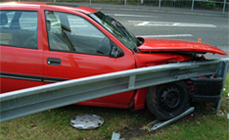 You may think winter snowfall makes for treacherous driving. But government figures show August is actually the most dangerous month on the roads, making it an important time to take precautions.
You may think winter snowfall makes for treacherous driving. But government figures show August is actually the most dangerous month on the roads, making it an important time to take precautions.
Based on records dating back to 1994, the National Highway Traffic Safety Administration (NHTSA) reports more Americans die in car crashes in August than at any other time of the year. In August 2009, that number totaled 2,864 deaths.
September had the next highest rate of traffic fatalities, followed by July. Weekends are the deadliest time on the roads throughout the year. Nationwide in 2009, there were an average of 123 deaths each day on Saturdays and 107 deaths on Sunday.
Experts say motor vehicle deaths rise in August because more people are on the road traveling for vacation, taking day trips and attending summer events.
Because of these factors, it is paramount to practice safe driving. Here, our Massachusetts personal injury lawyers offer safety tips to protect you and your family:
- Do not drink and drive.
- Travel slowly at night and make sure you are familiar with your route.
- Reduce distractions by putting away your cell phone and GPS.
- When traveling with children, explain you must concentrate on the road.
- On the highway, make sure children have distractions such as books and games.
- Never leave a child unattended in a vehicle.
- Wear your seat belt.
- Do not speed.
- Talk to teenagers about taking safety precautions such as limiting passengers and avoiding night driving.
Boston Welcomes New Bike Share Program
Boston has a new bicycle sharing program, implemented on July 28th, and it is off to a great start. The program, which is known as Hubway, stations bicycles throughout the city at terminals. You can rent a bike for a short period of time, or become a member and have a year of privileges.

Hubway is another step in making Boston a bicycle-friendly city. The city, under the inspiration of Mayor Menino and with the guidance of Olympic cyclist and Bicycle Program Director Nicole Freedman (shown at right with David White, at the Government Center Hubway Station), has expanded its bicycle lanes and its bicycle parking, and it now has added convenient bicycle rentals.
Hubway deploys 600 bicycles at around fifty stations around the city. A bike can be picked up at one station and parked at another, making the program convenient for commuters, students, and tourists. There is even an phone application called Spotcyle which gives up-to-the-minute data on which terminals have bikes or available parking docks.
David White, one of the attorneys at Breakstone, White & Gluck, called these efforts “great steps to making Boston a safer place to ride your bicycle.” The program will also reduce pollution and promote fitness.
White explained, “Cycling becomes much safer as motorists become more aware of bicycles sharing the roadways. Populating the city with hundreds more bicycles will actually increase safety for all bicyclists.”
Hubway also promotes safe cycling by urging cyclists to always wear a bicycle helmet, and to always observe traffic laws, which apply equally to bicyclists.
White urges Boston cyclists to observe Massachusetts bicycle laws (read more here). He also urges cyclists to check their automobile insurance policies to make sure they have adequate uninsured and underinsured motorist coverage, which provides protection if there is a bicycle accident (read more here).
Congratulations to the City of Boston and Hubway!
Honda and Ford Recall More than 2 Million Vehicles
 Two major manufacturers have issued car recalls impacting more than three million drivers.
Two major manufacturers have issued car recalls impacting more than three million drivers.
Ford last week announced the recall of more than 1.22 million pickup trucks because of a corrosion problem that can result in a gas tank falling off and catching on fire. The recalled trucks include the popular F-150.
The Ford recall affects older trucks sold between 1997 and 2004 in Canada, Washington D.C. and 21 cold-weather states where salt is used on the roads to prevent icing in the winter. Massachusetts is among those states.
The Michigan car manufacturer plans to notify affected owners in September and will repair the trucks for free. The models include: Ford F-150 (1997-2003), the 2004 F-150 Heritage, the F-250 (1997-1999) and the Lincoln Blackwood (2002-2003).
Ford said it has received eight reports of tanks falling, resulting in three injuries.
This is the second recall action involving Ford trucks in four months. In April, Ford expanded a recall of F-150 pickups to about 1.2 million trucks. In that case, the problem was the front-seat airbags could deploy without a motor vehicle crash.
Also last week, Honda Motor Co. announced the recall of more than 2.49 million cars, SUVs and minivans with defective transmission software. The defect can affect a car’s transmission if the software cannot keep up with movements, such as a vehicle trying to emerge from the snow or a driver moving between gears.
The Honda recall includes 1.5 million vehicles in the U.S., about 760,000 in China and 135,000 in Canada.
Globally, the recall affects four-cylinder Accord sedans (2005 – 2010). In the U.S. and Canada, the car recall also includes the CR-V crossover (2007 to 2010) and the small Element SUV from (2005 to 2008).
The company said no injuries or wrongful deaths have been reported due to the defect.
Honda will begin contacting U.S. consumers at the end of August about updating the software. The update will be free.
Read More
FDA Issues Warning About Transvaginal Mesh Surgery
The Food and Drug Administration (FDA) has issued a public notice on transvaginal mesh surgery after receiving thousands of reports about harmful complications. The notice advised patients and healthcare providers to consider alternatives to mesh surgery. The FDA has not issued a product recall, but will convene a panel this fall to make recommendations for the procedure.
Transvaginal mesh is a medical device implanted surgically to treat Pelvic Organ Prolapse (POP) and Stress Urinary Incontinence (SUI). These conditions can emerge after childbirth and pregnancy. POP occurs when organs bulge into the vaginal and bladder areas. SUI is a loss of bladder control.
Over 1,000 adverse events involving transvaginal mesh devices were reported to the FDA between 2005 and 2007. On October 20, 2008, the FDA issued a Public Health Notification reporting the figures. From January 2008 to December 31, 2010, there were an additional 2,874 reports of complications.
From 2006 to 2011, the FDA conducted a systematic review of published scientific literature and reported transvaginal POP repair with mesh has no advantage over traditional non-mesh repair. The FDA is advising health care providers to only choose mesh surgery after carefully comparing the risks and benefits with other surgical options.
The most frequent complications associated with transvaginal mesh surgery is erosion throughout the vagina, pain, infection, bleeding, pain during sexual intercourse, organ perforation and urinary problems. There were also reports of emotional problems, vaginal scarring and neurovascular muscular problems.
Many of these conditions involve painful remedies, including medical treatment, several surgeries and hospitalization.
Several companies manufacture transvaginal mesh, including Johnson & Johnson and Boston Scientific, C.R. Bard, Tyco Covidian and AMS. Injuries have not been linked to a single brand of mesh.
If you have been injured by a transvaginal mesh repair, you may be entitled to compensation. It is important to speak to an experienced product liability lawyer as soon as possible so you can obtain the proper medical attention and compensation for your injuries, loss of time at work and pain and suffering.
For a free legal consultation, contact the experienced Boston product liability lawyers at Breakstone, White & Gluck today. Call us at 800-379-1244 or use our contact form.
Read More
Head Injury Guidelines Begin for Student-Athletes This Fall
 Student-athletes in Massachusetts will add a new drill to their warm ups this fall: concussion training aimed at preventing deaths, long-term injuries and disabilities.
Student-athletes in Massachusetts will add a new drill to their warm ups this fall: concussion training aimed at preventing deaths, long-term injuries and disabilities.
In 2010, the state Legislature passed a law requiring training and education for anyone involved in public middle school and high school sports. The Department of Public Health issued guidelines in June detailing the requirements, which include:
- Parents, players, coaches, school nurses, volunteers and others involved in sports must participate in annual state-approved training on how to recognize the symptoms of concussions.
- Schools have a few options for fulfilling the training requirement, including offering training materials at parent meetings and online trainings from the Centers for Disease Control and Prevention and the National Federation of State High School Associations.
- Student-athletes who suffer a head injury must be immediately removed from play and get medical clearance before returning.
- Student-athletes diagnosed with a concussion must have a written plan for returning to the game and the classroom.
- Student-athletes with a history of head injuries must file an injury report before every season.
Across the country, an estimated 136,000 student-athletes suffer concussions in high school sports each year.
Concussions are often referred to as a “metabolic cascade,” a series of changes in which the brain’s nerve cells stop functioning properly and blood flow slows down.
Concussions can occur when athletes collide with other players, equipment or the ground. It is important for people who suffer concussions to reduce physical and cognitive activity. When there is a subsequent injury, concussions can be fatal and result in long term injuries impacting memory, mood and impulses.
Concussions can be difficult to diagnose in part because the effects are not visible on imaging tools such as CT scans or MRIs.
Massachusetts schools are making changes as awareness about concussions increases throughout the sports and medical community. Starting this fall, Ivy League football players are limited to suiting up for two full-contact practices each week. The pending contract agreement will implement new guidelines for National Football League (NFL) players as well.
For more information, click to read this article in The Boston Globe.
Read More
Defective Toy Truck Recalled by Fisher-Price
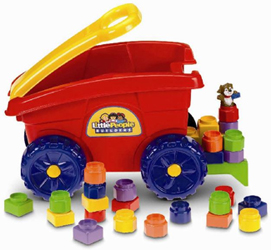 Fisher-Price has recalled a popular toy truck after its plastic handle has been found to pose a laceration risk.
Fisher-Price has recalled a popular toy truck after its plastic handle has been found to pose a laceration risk.
The East Aurora, New York toymaker recalled its Little People® Builders’ Load ‘n Go Wagon in cooperation with the U.S. Consumer Product Safety Commission (CPSC) and Health Canada this week. About 208,000 defective toy trucks were recalled in the United States and 2,800 in Canada. The toy trucks were sold in mass merchandise retail stores nationwide from June 2009 through July 2011 for about $25. They were manufactured in Mexico.
The toy truck is being recalled because its plastic handle has molded-in reinforcement. If a child falls on it, he could suffer a laceration.
The CPSC and Fisher-Price are aware of seven reports of personal injuries. Five reports came from children requiring surgical glue or stitches.
Consumers affected by the Fisher-Price recall can call 800-432-5437 or visit www.service.mattel.com for a free repair kit. The recall involves the wagon with the model number P8977. More information is available on the Mattel website.
Product recalls and deaths related to unsafe toys have declined in recent years, but toy-related injuries have been increasing. In 2009, 186,000 children under 15 were treated for toy-related injuries in emergency rooms, up from 152,000 in 2005.
In 2009, 12 children under 15 suffered wrongful deaths involving defective toys, a 50 percent decrease over the two prior years. Meanwhile, in 2010 there were 44 toy recalls, a significant drop from 172 in 2008.
The CPSC offers a few tips for parents: purchase age-appropriate toys, include safety gear whenever you buy sports equipment and ride-on toys and always be aware of your child’s location during play. Parents should also closely inspect toys prior to giving them to children.
Read More
Driving With Dogs Is An Increasing Distraction On The Roads
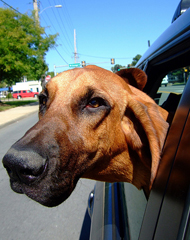 You are probably familiar with the list of distractions usually responsible for car accidents: texting while driving, talking on your cell phone, eating, the GPS and your children fooling around in the car.
You are probably familiar with the list of distractions usually responsible for car accidents: texting while driving, talking on your cell phone, eating, the GPS and your children fooling around in the car.
Well here’s another one to consider: if you are taking your family dog with you, there are additional things you should think about to avoid motor vehicle accidents.
Many people think about their dogs as affectionate friends, not as distractions on the road. But a new survey finds many drivers allow their dogs to ride with them in the car without restraints, increasing the risk for car accidents and serious injury to themselves and others, including the dogs.
The online survey by AAA and Kurgo, a manufacturer of pet travel products, polled 1,000 dog owners who had driven with their pets in the past year. More than half (56 percent) of the respondents reported driving with their dog at least once in the past month and 19 percent had taken their hands off the steering wheel to prevent their dog from jumping into the front seat.
Some 17 percent of the dog owners admitted to letting their dog sit on their laps as they drove and 13 percent said they fed their dog treats. Most alarming, 3 percent reported they had taken pictures of their dog while driving.
Only 16 percent reported putting their dog in a restraint while driving. Nearly 40 percent said they never considered buying a restraint and 42 percent said they believe their dogs are calm enough to ride without restraint.
While many of us have smiled at the sight of a dog hanging his head out of a car window, the survey highlights the fact that our dogs are becoming an increasing distraction on the roads. It is in everybody’s best interest to restrain animals in the car to avoid accidents.
The bottom line: Be your dog’s best friend. Get a proper restraint and avoid letting your dog be a dangerous distraction, even when just traveling around town on errands.
Read More
Prevent Teen Driving Accidents This Summer
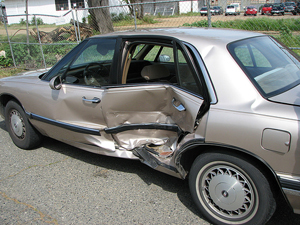 Summer is here and many teenagers who have licenses want to get behind the wheel and drive around with friends. But we all must remember safety first and to help them take precautions.
Summer is here and many teenagers who have licenses want to get behind the wheel and drive around with friends. But we all must remember safety first and to help them take precautions.
Motor vehicle crashes are the leading cause of death for teens in Massachusetts and across the country. In 2009, eight teenagers ages 16 to 19 died each day from motor vehicle injuries. When teenagers survive accidents, they may be left to cope with painful injuries that require years of recovery. And others are likely to be seriously injured as well.
The majority of teen car accidents happen within the first year a teen holds a license. The risk increases when teens drive with their friends or when they drive at night. While many associate drowsy driving with truck drivers, teen drivers are also likely to drive with sleep deprivation, increasing the likelihood of car accidents.
Many auto accidents result from driver inexperience. Because of this, teen drivers should stay on familiar roads for a few years. For example, it is probably too much for teenagers to attempt to drive from Worcester to Boston, Cambridge or Quincy during rush hour alone in their first year. Work up to distance. But talk to them about shopping plaza and fast food parking lots. These are frequent stops for teenagers. But parents can help teenagers by visiting stores with them, suggesting safe areas to park and talking to them about the busy hours. By waiting an hour, teens can drive into safer conditions.
Teen driving accidents can also result from recklessness, immaturity, ignoring safety laws, driving drunk and driving while distracted. Distracted driving behavior includes driving to loud music, being overly involved in conversations with friends, eating and drinking, talking on a cell phone and texting while driving.
The reckless behavior includes drag racing and car surfing on the exterior of a motor vehicle. This thrill-seeking behavior often leads to teens falling off the car and suffering head injuries and other injuries. This behavior is dangerous anytime a vehicle is moving, even at low speeds of 5 mph.
Massachusetts has a graduated licensing law for teenagers. Operators must hold a driver’s permit for six months before applying for a Junior Operator’s License at 16 1/2. They graduate up to a full license at 18.
For the first six months of holding a license, junior operators cannot ride with anyone under 18 in the car, except for family members. Teens are not allowed to use cell phones or drive between the hours of 12:30 a.m. to 5 a.m. They face stiff penalties if caught operating under the influence of alcohol.
The state has a strong law, but parents must speak to their teens before and after they receive their license about concentrating on the road, wearing seat belts and using good judgment when driving or riding as a passenger. Because teens are out of school and looking for things to do, summer is the most important time of year to have this discussion.
Resources for Parents
The Boston personal injury lawyers at Breakstone, White & Gluck have compiled a few resources to help parents talk to teenagers about avoiding car accidents:
Teen Safety Materials from the Centers for Disease Control & Prevention
Study: One Child Dies in Portable Pools Every Five Days
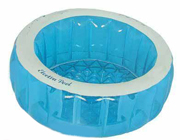 A surprising study published last month revealed that one child in the U.S. dies every five days in portable swimming pools during the warm weather months.
A surprising study published last month revealed that one child in the U.S. dies every five days in portable swimming pools during the warm weather months.
The study published in the journal Pediatrics challenges the popular idea that in-ground swimming pools pose a much larger safety risk. This study is significant because drowning has become the second leading cause of death among children age one to 14, according to the Centers for Disease Control and Prevention.
The study reports 209 deaths and 35 near-drownings of children under 12 in portable pools from 2001 through 2009. More than 90 percent of the children were under 5 and 81 percent of the swimming pool accidents occurred during the summer months.
The study’s classification of portable pools includes small wading pools less than 18 inches deep, inflatable pools and other soft-sided pools up to four feet deep. The study was conducted by National Hospital and Independent Safety Consulting in Rockville, Maryland. Researchers say the findings are comparable to in-ground pool drownings.
Researchers say owners of portable pools often fail to take the same safety precautions as those who own in-ground pools. They set pools up quickly without taking the time to install fencing, pool alarms, safety covers and lockable ladders.
The numbers also show in many cases, children are swimming in portable pools without adult supervision. Children were supervised by parents in only 43 percent of the drownings and swimming pool accidents. Parents were home 73 percent of the time.
Read more about the study published in Pediatrics. Read More

